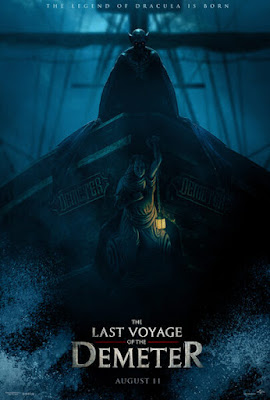People forget Bram Stoker’s Dracula is an epistolary novel, probably because most film versions cannot replicate its use of letters and journals to tell its classic tale. One of the scariest sections of the book was the “Captain’s Log” of the Demeter, the ship contracted to transport Dracula’s coffins to London. Focusing on those often glossed-over passages is good idea for a fresh take on the legendary vampire, but the results are somewhat mixed in Andre Øvredal’s The Last Voyage of the Demeter, which opens nationwide tomorrow.
Obviously, this voyage will end badly, especially for Captain Elliot. It is too bad, since he just announced his retirement. Their journey starts promisingly, except for the local Bulgarian seamen, who freaks out at the sight of their Dragon-stenciled cargo. He will be replaced by Clemens, a trained doctor eager to return home after knocking around the Balkans.
Clemens gets on famously with the Captain’s grandson Toby (whose life he saved) and mostly passably with the rest of the crew. However, tensions start to rise when their livestock is mysteriously slaughtered. Clemens comes into more direct conflict with cruder, more superstitious crew members, when he insists on nursing an emaciated stowaway back to health, after they discover her buried half-dead in their strange dirt-filled crates. Obviously, she was supposed to be food for the vampire now hunting the Demeter crew.
The Dracula of Øvredal’s Demeter deliberately resembles Max Schreck in Murnau’s Nosferatu, which is a shrewd aesthetic choice for a film partially conceived as Alien on a 19th Century sailing ship. The vampire makeup applied to Javier Botet is appropriately monstrous and creepy. A distinguished looking gent in a cape just wouldn’t work in this context.
Frankly, the best part of Demeter is the gothic look of its period production. The design team (including production designer Edward Thomas and art director Marc Bitz) create a richly detailed shipboard environment, showing us all the narrow passageways and rat-infested chambers of the Demeter. The ship is cool, in a dank, uninviting kind of way.
Unfortunately, screenwriters Bragi F. Schut and Zak Olkewitz depart from established lore in distractingly annoying ways. No longer does the sight of the cross hold any power over Dracula. This does indeed seem to reflect an ugly anti-Christian bias, considering Joseph the abrasively Catholic Filipino cook, is the first rat to abandon the ship—and the audience is not expected to feel sympathy for him, when he gets his gory comeuppance.



















